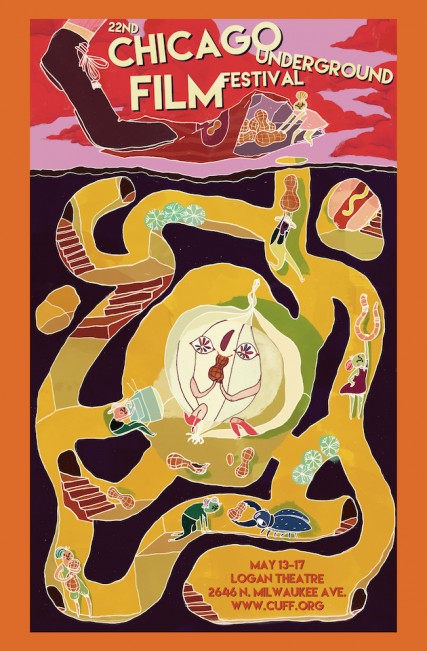By MCN Editor editor@moviecitynews.com
Chicago Underground Film Fest “Bar Talks” Moderated By Ray Pride
Where Filmmakers Meet The Audience
Moderated By Film Critic Ray Pride
The Logan Lounge at Chicago’s Logan Theatre
May 13-17, 2015
The Chicago Underground Film Festival, the world’s longest-running underground film festival, presents the fourth edition of “Bar Talks,” presented by Tribeca Flashpoint College, an informal series of talks among local and visiting filmmakers during CUFF. In four 90-minute sessions, audiences will join in spirited, wide-ranging conversations about the rapid evolution of filmmaking in the modern media landscape, the exciting revolution seen through emerging voices, and how the bold and risk-taking films chosen by the festival’s programmers reflects the best and most promising trends crowding the horizon. Led once again by Newcity film critic Ray Pride, the Bar Talks will take place in the Logan Theatre’s Logan Lounge in a democratic atmosphere without the conventions of stuffy “panel discussions” seen (and half-heard) at far too many film festivals. Each session is free and open to the public.
“Each of these filmmakers who will be sharing stories and insights are underground, even experimental filmmakers, in one way or another,” Pride says. “Their audacity in storytelling is matched only the generosity that’s characteristic of Chicago artists, which the world recognizes more each and every year. “
“Bar Talks” are part of the 2015 Chicago Underground Film Festival (May 13-17 at the Logan Theatre). The dates, topics and scheduled guests (SUBJECT TO CHANGE) are listed below. (Find full CUFF information here.)
Thursday, May 14, 5pm: CINEMA DELIRIUM: The Making Of A Ruined Heart
Ray and Khavn de la Cruz will discuss his opening night film, Filipino filmmaking, working with cinematographer Christopher Doyle, and his prolific artistic output. Khavn is a published author, poet and musician and has made thirty-two features and more than 100 shorts since 1994; as of May 5, Khavn counts 159 films total. [Trailer here.]
Friday May 15, 5pm: TRUE FICTION
Guest filmmakers will join Ben Sachs, film critic and Chicago Reader contributing writer; Northwestern Assistant Professor and director of “Bite Radius” (CUFF 2015) Spencer Parsons; CUFF veteran Jennifer Reeder, director of “A Million Miles Away” (CUFF 2014) and “Blood Below The Skin” (CUFF 2015); Jerzy Rose, director of 2011 opening night film, “Some Girls Never Learn” and “En Plein Air” (CUFF 2015).
Saturday May 16, NOON. THE NAKED TRUTH
Guest filmmakers will join Kartemquin Films producer Maggie Bowman (Al-Jazeera America’s “Hard Earned”); Ruth Leitman (“Lipstick & Dynamite,” “Hard Earned”); Dan Rybicky (co-director, 2015’s “Almost There”); Bill Siegel, co-director of the Oscar-nominated “The Weather Underground” and “The Trials of Muhammad Ali”; artist and filmmaker Deborah Stratman (“Hacked Circuit,” CUFF 2015) and documentary filmmaker Deborah Tolchinsky, director of Northwestern’s MFA in Documentary Media program.
Sunday May 17, NOON: LOCAL OPTION: Making Films In Chicago
Guest filmmakers will join installation artist and filmmaker Melika Bass (“Waking Things,” “The Latest Sun Is Sinking Fast”); Nicole Bernardi-Reis, IFP/Chicago President and producer “Algren,” “Radical Grace,”; Stephen Cone, educator-actor-director “The Wise Kids,” “Henry Gamble’s Birthday Party”; and Jennifer Reeder (see TRUE FICTION).
The longest-running movie reviewer in Chicago, moderator Ray Pride is film critic of Newcity, a longtime contributing editor of IFP-published Filmmaker magazine, news editor of Movie City News and a photographer. Find links to his work at raypri.de














